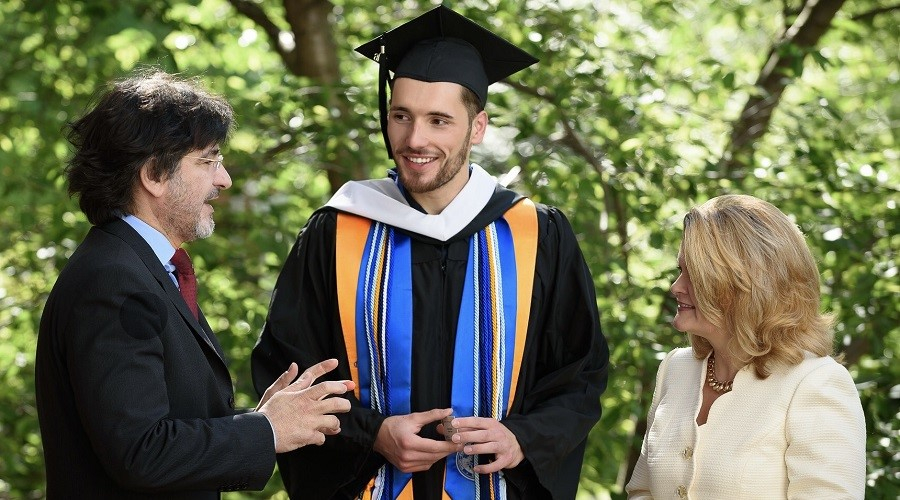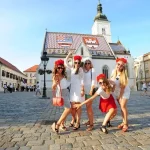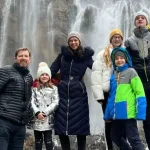I was born in 1993 in Split, Croatia. I am the oldest of three children born to our mom, a Croatian language professor, and our dad, a telecommunications engineer. My siblings and I grew up in lovely Posusje, in the West Herzegovina region of Bosnia-Herzegovina.
Thanks to a generous merit-based scholarship, in 2009, I moved away from home to finish my two last years of high school at the United World College in Mostar (UWCiM), where I lived and went to class with kids from more than 40 other countries.
Then, I got a full-ride scholarship to study at a liberal arts college in Maryland (Washington D.C. Metro Area). I was pretty involved in campus life there, having served as Class President and Model United Nations president, which in turn led to an opportunity to speak at the United Nations General Assembly Hall in New York City at some point.
After four transformative years, I graduated with a degree in Political Science and French and started working in PR and marketing as part of the largest network of nonprofits in the U.S., fighting for education, health care, and financial stability. I lived in the States for almost seven years. In April 2017, I packed my whole life in a suitcase and left. Admittedly, I was heartbroken about it, but the uprooting taught me an important lesson — one of letting go.
After that, determined never to return to my hometown or Croatia, I ended up in Bergen. In case you’re not familiar, Bergen is Norway’s second-largest city, nestled between seven mountains on the west coast of this stunningly beautiful country. It’s also one of the rainiest cities in the world, and as you can imagine, this Mediterranean boy was not having it. I left after about eight months.
On my way out, I stopped by Berlin, Germany, for what was supposed to be a two-day trip. As I was there, I realized Berlin had a thriving startup scene. I had already been looking to break into the software industry, so naturally, I found myself wondering: “Why not move here?” Everything happened kind of quickly — almost accidentally, even — but I did end up living there for two years. I loved every minute of it.
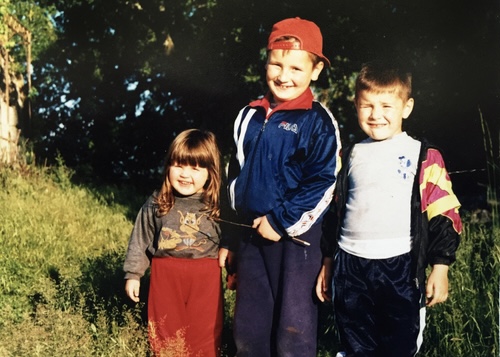
1. You made the switch to Croatia. Tell us a little about the decision process and how long it took for you to get on the plane.
Yes, eventually, I did the exact thing I swore I’d never do: I moved to Zagreb.
It’s funny how life can take you on unexpected journeys. Although I was drawn to return closer to home, there was a part of me that felt reluctant. It felt like admitting defeat in some game I was playing with myself — subconsciously, at least — and I initially refused to consider it as a sensible option.
But after months of consideration, I realized that moving to Zagreb could be just the thing I needed to grow both personally and professionally. Being closer to the beautiful Adriatic and my parents in Herzegovina was a major advantage. And as a digital marketing professional, I knew I could continue my work as long as there was a stable internet connection, which there is.
It was a difficult decision, but sometimes we have to take a leap of faith to find our true path. This felt like one of those moments.

2. What did your family and community back home think of your decision at the time?
I got a mix of reactions. All my friends were a bit perplexed, but they said: “Happy if you’re happy.” My parents always supported me in all my decisions, and they were elated that I was moving closer to home. That was for sure. However, I could tell they were having some reservations because they knew I had worked my whole life to build a better life elsewhere. Of all three kids, they always considered me the least likely to move to Croatia. So the irony was evident to us all: Both of my siblings were already living abroad when I announced I would be moving to Zagreb. The lesson I learned from this move was to never say never.
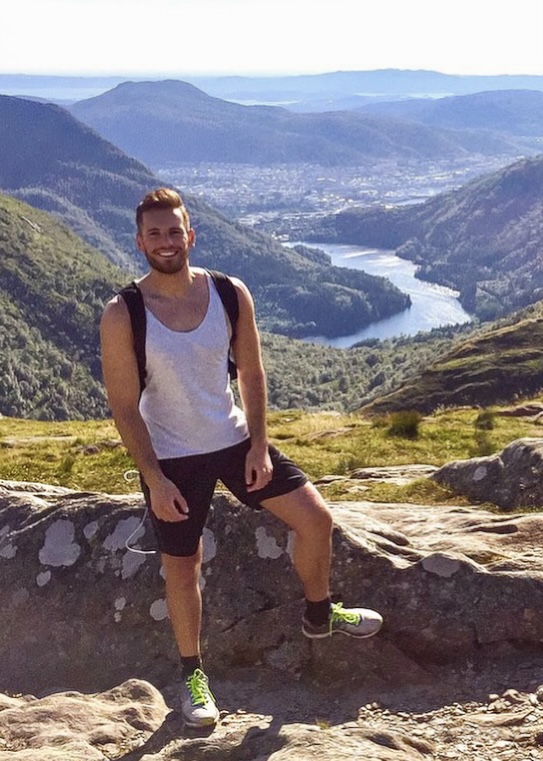
3. Where did you get your information about the realities of Croatia prior to coming?
At that point, I stopped keeping track of local news in Croatia. I knew HDZ was in power, Andrej Plenkovic was the serving PM, and there were two weekly flights from Zagreb to Berlin (in case I wanted to run back). But beyond that, I didn’t know much because I had never lived in Croatia for the long haul before.
So in many ways, it felt like moving to a foreign country. After almost a decade spent across the U.S., Norway, and Germany during my formative years, moving back to the Balkans required me to reacclimate to the local ways of being.
I was lucky to know some people here already, so I relied heavily on friends to give me the information I needed ahead and after our move. Of course, I also researched information online across many sources, including TCN.
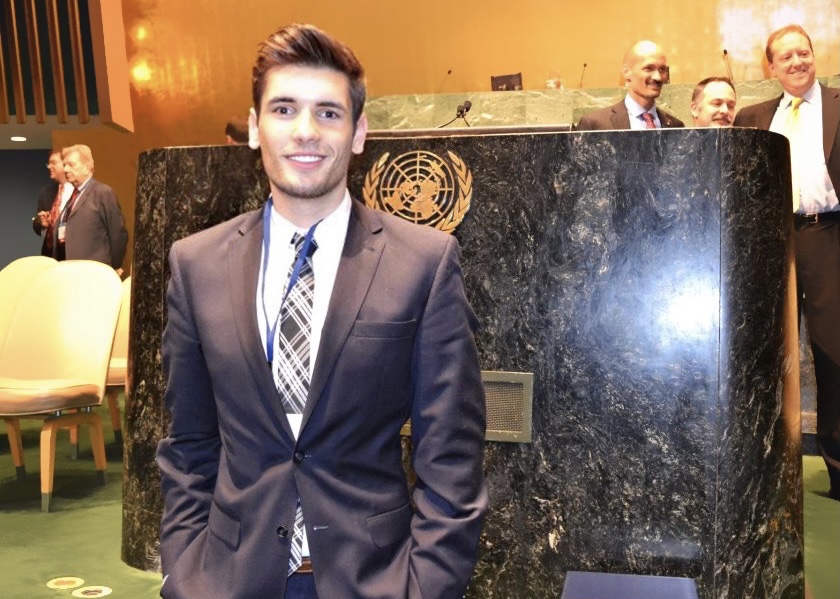
4. What were you most nervous about making the switch? What was your biggest fear, and what was the reality of what you found?
Job opportunities and economic circumstances at large were my two main concerns. Considering the lower standard of living in Croatia relative to EU members in the west and the north, I knew my best shot was freelancing. As 2020 rolled around, amid the pandemic and a global shift to a new, digital reality, I finally decided to make my side gig my full-time gig. And that is the story of how MP Creative Services, my full-service digital marketing business, was (officially) born.
Currently, MP Creative Services is on the back burner, as I am focusing on a role I took at Five, an Endava company. As a growth marketing specialist there, I work at the intersection of marketing, behavioral economics, data analysis, and product design to drive mobile app growth for some cool U.S. brands.
5. Think back to the time before you arrived. What were your perceptions about Croatia, and how were they different from the reality you encountered?
“Hercegovac u Zagrebu” was not a cliche I planned on embodying at any point in my life, but I became precisely that when I moved here. The metamorphosis implied developing specific coping mechanisms for when I’m just going about my business and someone starts talking crap about Hercegovci. The funny thing is, when I was younger, I tried to distance myself from that part of my identity as much as possible (probably because of its negative connotation). But as I grew older, I embraced it, and now I find myself defending it against libelous Purgeri — generally, in a playful, joking context.
As an openly gay man, my other big concern was that I did not want to go back into the closet and start denying that part of my identity again — one that I worked so hard on embracing in the first place.
Croatia is a deeply conservative society, with traditional Catholic values at the core of the nation’s DNA. I was worried that I would struggle with that, but I decided never to reduce myself or pretend to be someone else for the comfort of others. I needed to be brave and true to myself at all times. I understood that, with every interaction, I had the opportunity to dispel misconceptions and build dialogue — hopefully, seeing a change of heart in someone every once in a while. This matters to me because it’s not just about me; it’s bigger than that.
To my surprise, I’ve experienced more kindness during my time here than I ever expected from the people of Zagreb and Croatia. It was to the point where I felt like the closed-minded one because of how stubborn I was in the generalizations I made about an entire population. Of course, this does not mean other gay boys/men and girls/women across the country are not suffering injustice and inequality daily. But based on my experiences with people whose paths crossed mine, I am more hopeful about the kind of society we can build for future generations than I have ever been in the past.
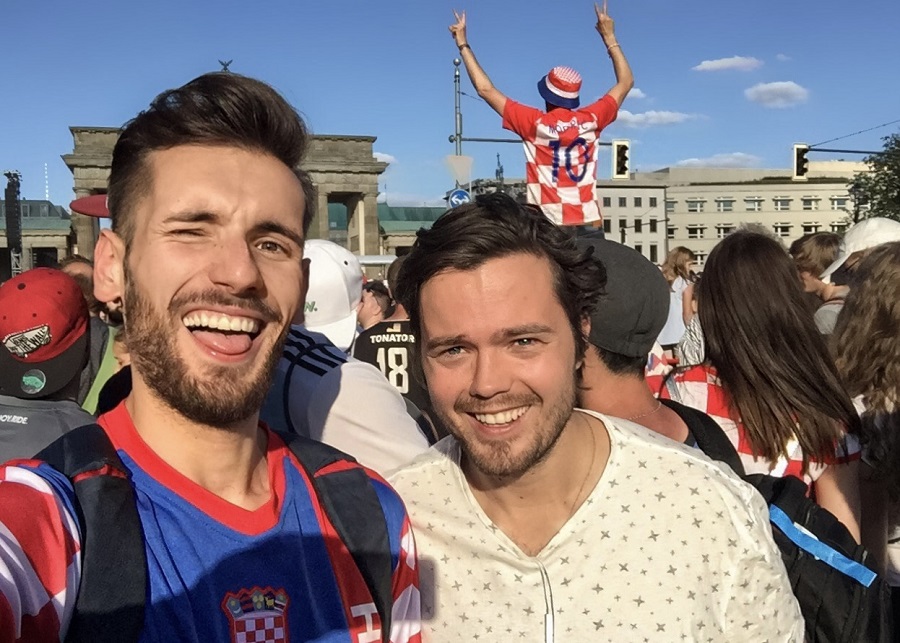
6. You are still here, so obviously, the pros outweigh the cons. Tell us about some of the things that you love about being in Croatia, as well as some of the things you don’t like.
Well, I have been here for almost three years now. And I would be lying if I said I have fallen in love with living in Zagreb. I am still working on it. On the one hand, I have fallen out of love with Croatia because — now that I live here — I have stopped idealizing it. On the other hand, I have also fallen in love with it because of the people who live here, the passion and dedication I see them put into the things they do, and the great stuff they bring into the world when they put their minds to it.
Sure, many aspects of living in Croatia suck. There’s no sugarcoating it. Food, rent, and utilities are too damn expensive, yet salaries remain below the EU standard for most. Things are about to get even worse with inflation raging and the winter coming. Working families and seniors are affected the most. Speaking of seniors, too many retired people have no choice but to supplement their income by digging through the trash, looking for discarded bottles to trade in for a couple of kunas. Such is the fate of the average worker retiring in Croatia today.
We’re still using Tito’s Communist regime and the Homeland War that ensued as a scapegoat for everything wrong in the country today — almost thirty years after the war ended. In the meantime, corruption remains widespread, killing the system from the inside, like Stage 4 cancer. In terms of rights, many have none. Women’s rights are still an issue, as are gay rights, ethnic minority rights, and the rights of immigrants arriving on the border. The list goes on… But keeping things in perspective, no country is perfect. In my book, it comes down to finding someplace worth fighting for, someplace worth calling home. I suppose I found that ‘something’ here.
In 2003, Berlin Mayor Klaus Wowereit famously called his city “poor but sexy”. Berlin is no longer poor, so I will take the liberty of conferring this title upon Zagreb. Poor but sexy is a great way of describing it because its charm is indeed in the rundown Austro-Hungarian facades, colorful street art, trendy food spots, and hipsters hanging in front of the National Theater.
Don’t forget about the balmy summers, either! The city clears out, and you can enjoy parks, forests, and Jarun Lake all to yourself. And as the summer slowly fades away, all the artists, creators, innovators, and other eccentrics who call Zagreb home return. The city comes alive again, almost overnight. Before you know it, it’s time for Advent — Christmas lights, ice skating, mulled wine, and friends.
Okay, fine! I do like Zagreb.
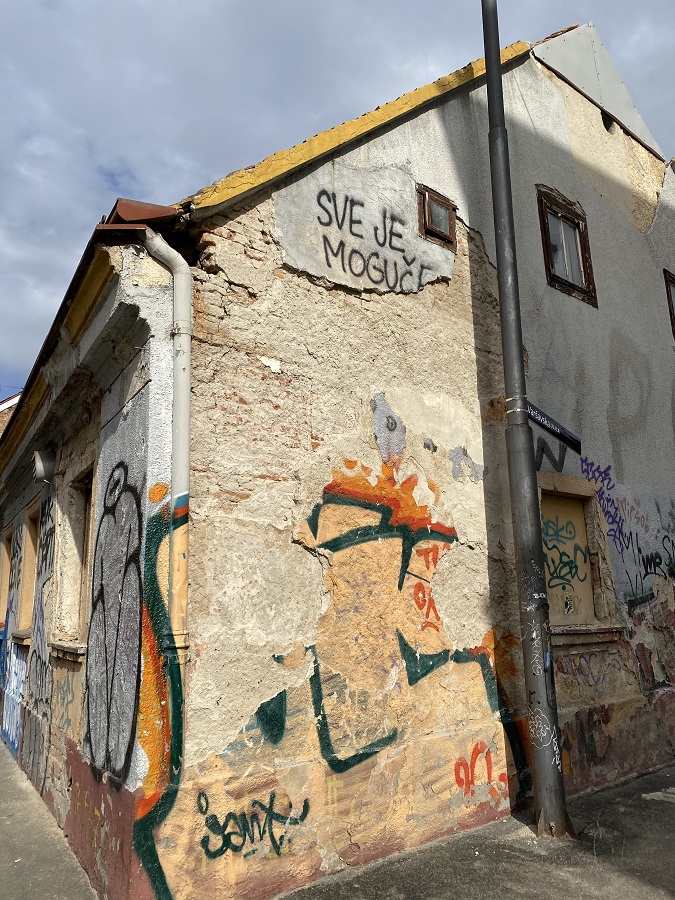
7. What advice do you have for others thinking about making a move from the diaspora?
Just do it!
That would be my advice to anyone considering moving to (almost) any country. I think embracing the unknown, leaping into uncharted territory, and taking yourself out of your comfort zone is the only way to grow. And trust me when I say: Croatia will give you a run for your money.
Worst-case scenario: Even if you end up hating it, you always have the option of moving back home. The country you, your parents, or your ancestors went to in search of a better life. Perhaps they found it. Perhaps not. In any case, we all get to be the authors of our own stories. The world is your oyster. (And serendipitously, Croatia is one of the best places on the planet to sample this decadent treat. If this is not a sign…)
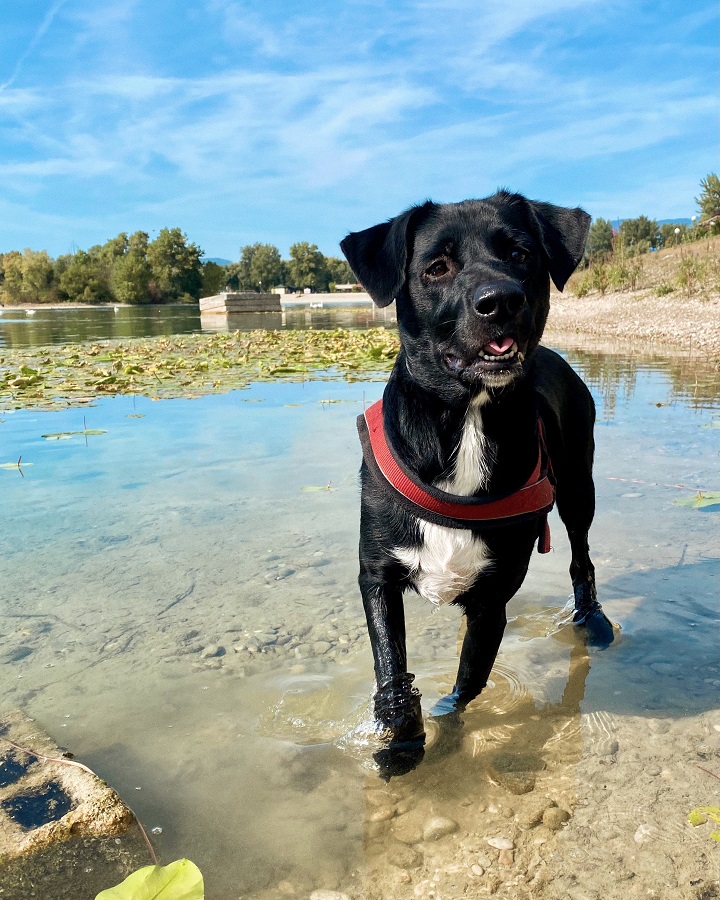
8. How do you think Croatia can better assist those who are looking to return to the Homeland?
Oh, man, where do I even start…
Generally, I think our government should actively be looking into ways to make it simpler for people to come here and contribute to our society, whether it’s by bringing know-how or investments, opening a business, starting (or moving) a family here, or any other number of ways in which they could enrich the fabric of our society.
Tax cuts for the first year might be a reasonable idea to explore. Programs assisting families moving with kids with needs such as daycare, school, medical care, and so on. And in the post-pandemic world, offering more online resources across a spectrum of public services is paramount. This opens up the door to opportunities to work closely with the private sector, especially tech companies that have the know-how to bring forward-looking, ambitious ideas to life.
Andrej Plenkovic’s government, as profoundly flawed as it may be, seems to understand this on some level. The digital nomad visa project is a great example: While ‘forward-looking’ is not a word I’d use to describe much else of what goes on in Croatia’s politics these days, this truly is the kind of rare political project that can have a deep and lasting impact on the country’s growth trajectory. Though the effort was spearheaded by the Dutch-born entrepreneur Jan de Jong (arguably a greater patriot than most native Croats), the government still handled the legal and logistical prerequisites with unprecedented expediency. I bet no other political project was executed that fast in the country’s modern history.
Then, there’s also the question of the booming software industry, expected to surpass the behemoth that is tourism in a few years in terms of value-add GDP. Yet government policies had very little to do with that success. Croatian software companies are achieving truly remarkable results on the global scale with no outside help. As a country, we should be making it easier for them to attract talent and investments. By designating the software industry as a strategic, thereby empowering promising startups, we empower the Croatian economy, making it more resilient to pandemics, wars, inflations, and other capitalist maladies.
California is fine and well, but it’s possible to build a multi-million-dollar company in Croatia too. It’s been done several times over the past 10 years, and there’s always room for more innovation. Also, we’re lucky to have many in the Croatian diaspora communities around the world in our corner. Many passionate people out there have the expertise, the motivation, and the cash to help build Croatia’s “silicone dream”.
Little geniuses are sitting in schools across the country right now. With the right support, in the future, these kids might find solutions to some of the world’s most pressing issues — maybe even save the world. This is why I hope we divert more resources to education, bringing our schools and universities up to par with those in Finland and other countries pioneering new, innovative education models. We have to make sure we start introducing kids to technology as early as possible, giving them the tools they need to learn new skills. That’s how we attract more families looking for a safe place to raise their little geniuses.
****
Thanks, Marko!
You can follow more stories in the Croatian Returnee Reflections series in our dedicated TCN section.
Would you like your returnee story – positive or negative – to be featured in this series? Contact [email protected] Subject Returnee.
****
What is it like to live in Croatia? An expat for 20 years, you can follow my series, 20 Ways Croatia Changed Me in 20 Years, starting at the beginning – Business and Dalmatia.
Follow Paul Bradbury on LinkedIn.
Croatia, a Survival Kit for Foreigners will be out by Christmas. If you would like to reserve a copy, email [email protected] Subject 20 Years Book

